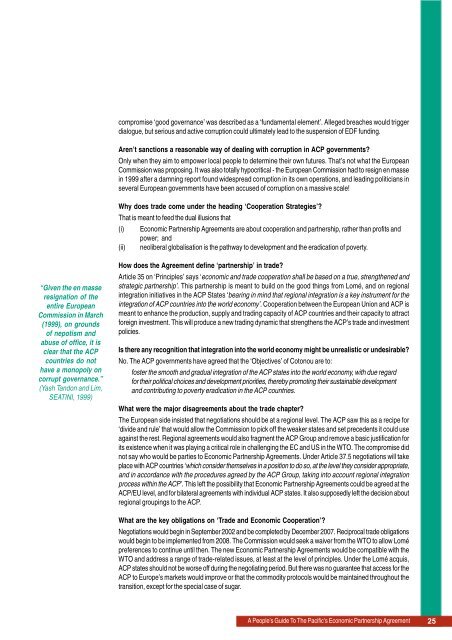REPA Booklet - Stop Epa
REPA Booklet - Stop Epa
REPA Booklet - Stop Epa
Create successful ePaper yourself
Turn your PDF publications into a flip-book with our unique Google optimized e-Paper software.
compromise ‘good governance’ was described as a ‘fundamental element’. Alleged breaches would trigger<br />
dialogue, but serious and active corruption could ultimately lead to the suspension of EDF funding.<br />
Aren’t sanctions a reasonable way of dealing with corruption in ACP governments?<br />
Only when they aim to empower local people to determine their own futures. That’s not what the European<br />
Commission was proposing. It was also totally hypocritical - the European Commission had to resign en masse<br />
in 1999 after a damning report found widespread corruption in its own operations, and leading politicians in<br />
several European governments have been accused of corruption on a massive scale!<br />
Why does trade come under the heading ‘Cooperation Strategies’?<br />
That is meant to feed the dual illusions that<br />
(i) Economic Partnership Agreements are about cooperation and partnership, rather than profits and<br />
power; and<br />
(ii) neoliberal globalisation is the pathway to development and the eradication of poverty.<br />
“Given the en masse<br />
resignation of the<br />
entire European<br />
Commission in March<br />
(1999), on grounds<br />
of nepotism and<br />
abuse of office, it is<br />
clear that the ACP<br />
countries do not<br />
have a monopoly on<br />
corrupt governance.”<br />
(Yash Tandon and Lim,<br />
SEATINI, 1999)<br />
How does the Agreement define ‘partnership’ in trade?<br />
Article 35 on ‘Principles’ says ‘economic and trade cooperation shall be based on a true, strengthened and<br />
strategic partnership’. This partnership is meant to build on the good things from Lomé, and on regional<br />
integration initiatives in the ACP States ‘bearing in mind that regional integration is a key instrument for the<br />
integration of ACP countries into the world economy’. Cooperation between the European Union and ACP is<br />
meant to enhance the production, supply and trading capacity of ACP countries and their capacity to attract<br />
foreign investment. This will produce a new trading dynamic that strengthens the ACP’s trade and investment<br />
policies.<br />
Is there any recognition that integration into the world economy might be unrealistic or undesirable?<br />
No. The ACP governments have agreed that the ‘Objectives’ of Cotonou are to:<br />
foster the smooth and gradual integration of the ACP states into the world economy, with due regard<br />
for their political choices and development priorities, thereby promoting their sustainable development<br />
and contributing to poverty eradication in the ACP countries.<br />
What were the major disagreements about the trade chapter?<br />
The European side insisted that negotiations should be at a regional level. The ACP saw this as a recipe for<br />
‘divide and rule’ that would allow the Commission to pick off the weaker states and set precedents it could use<br />
against the rest. Regional agreements would also fragment the ACP Group and remove a basic justification for<br />
its existence when it was playing a critical role in challenging the EC and US in the WTO. The compromise did<br />
not say who would be parties to Economic Partnership Agreements. Under Article 37.5 negotiations will take<br />
place with ACP countries ‘which consider themselves in a position to do so, at the level they consider appropriate,<br />
and in accordance with the procedures agreed by the ACP Group, taking into account regional integration<br />
process within the ACP’. This left the possibility that Economic Partnership Agreements could be agreed at the<br />
ACP/EU level, and for bilateral agreements with individual ACP states. It also supposedly left the decision about<br />
regional groupings to the ACP.<br />
What are the key obligations on ‘Trade and Economic Cooperation’?<br />
Negotiations would begin in September 2002 and be completed by December 2007. Reciprocal trade obligations<br />
would begin to be implemented from 2008. The Commission would seek a waiver from the WTO to allow Lomé<br />
preferences to continue until then. The new Economic Partnership Agreements would be compatible with the<br />
WTO and address a range of trade-related issues, at least at the level of principles. Under the Lomé acquis,<br />
ACP states should not be worse off during the negotiating period. But there was no guarantee that access for the<br />
ACP to Europe’s markets would improve or that the commodity protocols would be maintained throughout the<br />
transition, except for the special case of sugar.<br />
A People’s Guide To The Pacific’s Economic Partnership Agreement 25
















